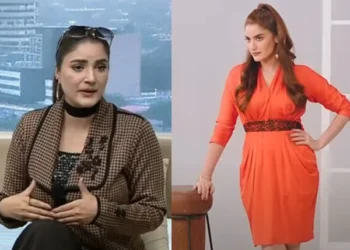Introduction: A Candid Perspective from Saira Yousuf on Modern Love
Renowned Pakistani actress and model Saira Yousuf has recently opened up about a topic that is often overlooked in discussions about love and relationships. While speaking during a candid conversation on a talk show, Saira shed light on how excessive attention and constant praise, although seemingly romantic at first, can often be red flags in disguise—warning signs of a potentially unbalanced or unhealthy relationship.
Her remarks sparked conversation across social media, with fans and relationship experts alike applauding her for bringing awareness to emotional manipulation, toxic behavior, and the difference between genuine affection and performative love.
Understanding the Hidden Dangers in Seemingly Romantic Behavior
When Love Becomes Overwhelming
Saira Yousuf emphasized that not all forms of attention in a relationship are healthy. While gestures of love, admiration, and praise are important, when they become excessive or constant, they can signal deeper problems.
She explained, “Initially, all of this attention and praise feels wonderful—it makes you feel special. But often, this intensity is short-lived and doesn’t stem from genuine connection. These are temporary emotions, and they can set unrealistic expectations or mask deeper insecurities.”
This perspective resonates strongly in an age where love bombing—a manipulative tactic of showering someone with affection to gain control—is becoming more common, especially in relationships formed through social media and dating apps.
What Is Love Bombing and Why Is It Harmful?
Definition and Characteristics
“Love bombing” is a term used in psychology to describe a pattern of excessive attention, admiration, and affection with the goal of manipulating the target. It often includes constant compliments, lavish gifts, non-stop communication, and pressure to commit quickly.
According to mental health professionals, love bombing is not sustainable or genuine, and it can often lead to emotional dependency, confusion, and even emotional abuse.
How It Differs from Genuine Affection
Saira Yousuf pointed out that real love develops slowly and organically over time. “Instant intensity,” she warned, “often indicates a temporary infatuation or a desire for control rather than true emotional intimacy.”
This distinction is essential. Genuine love respects boundaries, grows with mutual understanding, and doesn’t require constant validation or the erasure of individuality.
Saira Yousuf’s Views on Emotional Balance in Relationships
Past Experience and Evolving Wisdom
Saira, who has experienced the highs and lows of public relationships, has often been praised for her grace and resilience. Her comments likely stem from personal insight and growth, which makes her voice especially influential for young women navigating relationships today.
“We tend to mistake constant praise for genuine affection,” she explained. “But a relationship that feels like too much, too soon can actually leave you emotionally drained in the long run.”
Restlessness in Abuse vs. Restlessness in Obsession
She also added an important observation: “When a man mistreats or abuses a woman, she becomes restless and insecure. But even excessive positivity—like obsessive attention—can create a similar kind of emotional unease. It might seem harmless, but it often leads to emotional imbalance.”
This view opens a critical dialogue about how we define abuse. It is no longer just about anger or physical harm, but also about subtle control and manipulation that may be disguised as love.
How Society Romanticizes Red Flags
The Media’s Role
In South Asian television dramas and movies, toxic behaviors are often glorified as passion. Characters who stalk, control, or emotionally manipulate their partners are romanticized rather than condemned. Saira’s stance is a much-needed correction to these harmful narratives.
Her statement encourages self-awareness among women and men alike—to differentiate between love that uplifts and love that suffocates.
Social Media and Unrealistic Relationship Standards
In the era of curated Instagram love stories, over-the-top romantic gestures are normalized and even envied. Couples compete to showcase affection online, which may set unrealistic expectations and pressure individuals into overcompensating in relationships.
Saira’s insight reminds us that what looks perfect on the outside may not be healthy or sustainable on the inside.
Signs of an Unhealthy Relationship Masquerading as Love
Here are some behaviors to watch for, as discussed by both Saira Yousuf and relationship experts:
- Intense affection in the beginning with pressure to commit quickly.
- Unsolicited gifts and flattery that feel overwhelming.
- Constant checking in, demanding availability, or invading personal space.
- Getting offended when you set boundaries or ask for space.
- A sudden shift from extreme affection to coldness if their control is challenged.
These are all symptoms of emotional manipulation, and recognizing them early can help prevent long-term psychological harm.
What Healthy Love Really Looks Like
Saira’s Message to Young People
In her heartfelt message, Saira urged youth and especially women to value emotional safety and slow-building trust over fireworks and fairytales.
“True love allows you to breathe,” she said. “It doesn’t demand, it doesn’t overwhelm—it supports, respects, and evolves with you.”
This powerful statement is especially relevant in Pakistan’s conservative yet evolving society, where relationship expectations are rapidly shifting amid Western and traditional influences.
Celebrity Influence and Mental Health Awareness
Saira Yousuf’s comments are part of a broader trend of Pakistani celebrities speaking out about mental health, emotional well-being, and toxic relationship dynamics. Public figures using their platforms to promote awareness has a strong ripple effect, especially among younger fans.
Her remarks also help destigmatize emotional abuse and broaden our understanding of how manipulative love can damage one’s self-esteem and mental peace.
Conclusion: A Powerful Reminder About Red Flags in Disguise
Saira Yousuf’s bold comments serve as an important reminder that not all love is healthy and that excessive attention and praise can be warning signs, not gestures of affection. In a time where relationships are often influenced by fast-paced digital interaction, emotional awareness and self-respect are more critical than ever.
Her message encourages individuals to look beyond the surface, trust their instincts, and seek relationships that offer balance, mutual respect, and emotional peace.

























